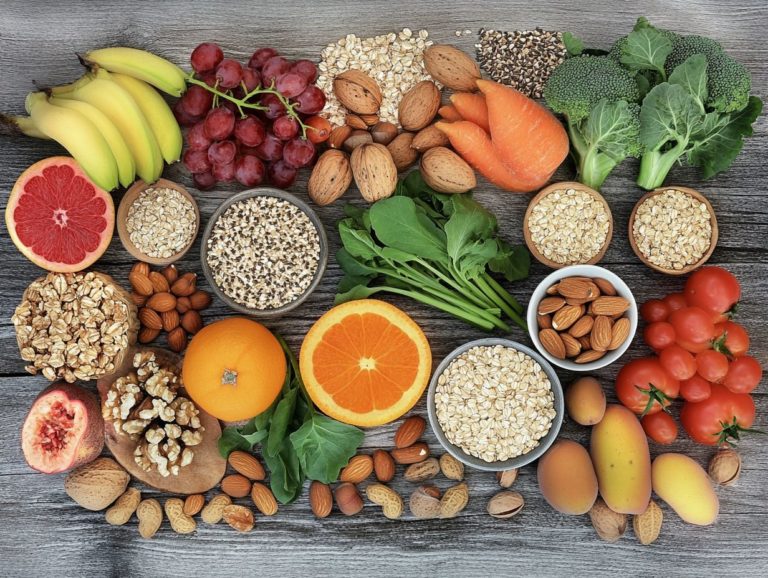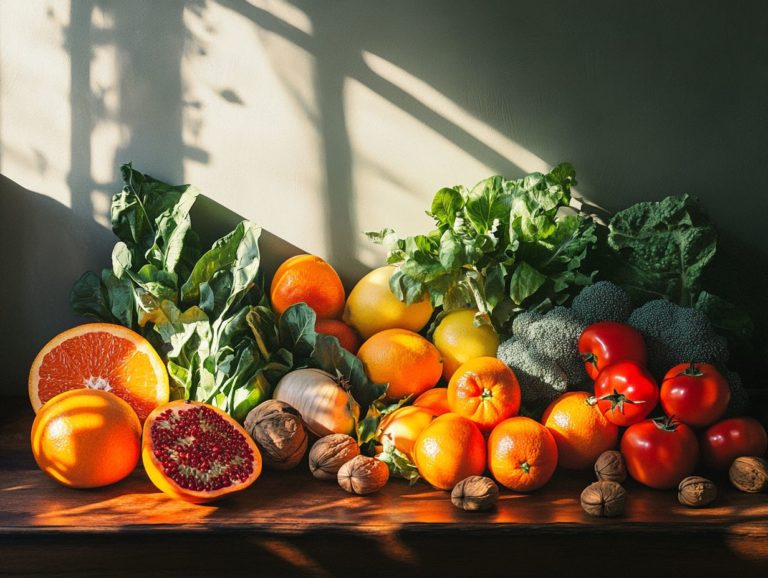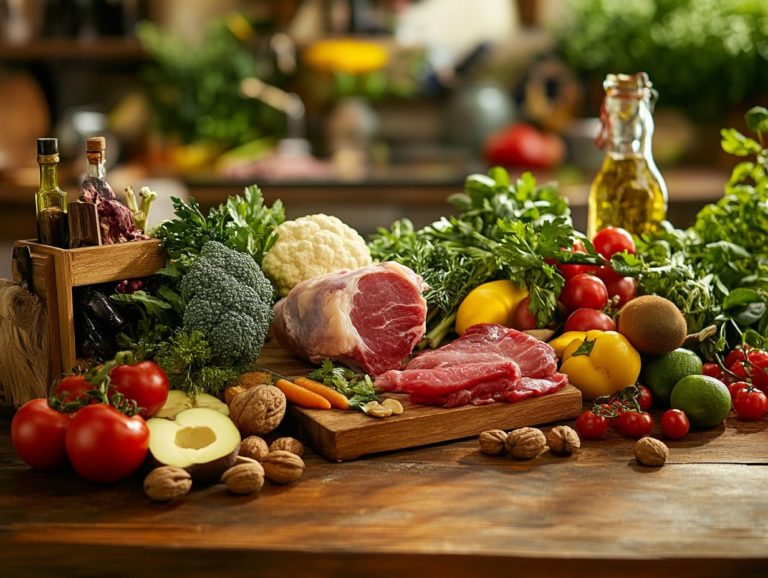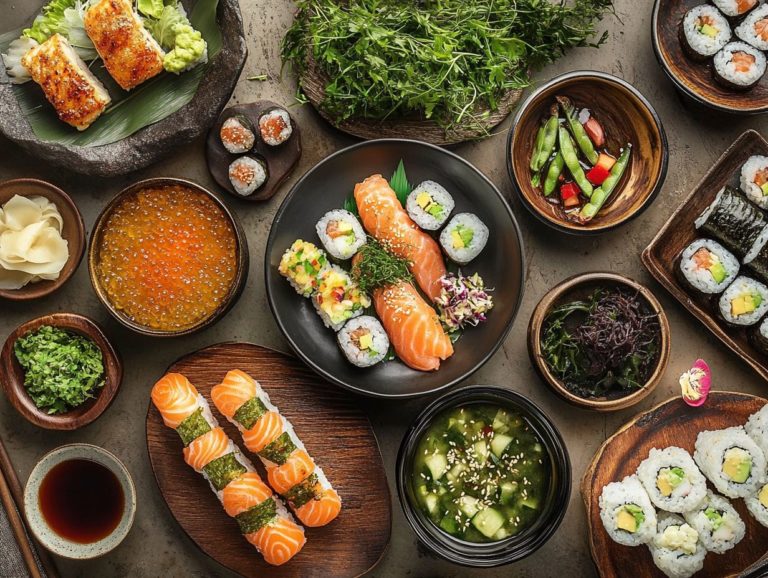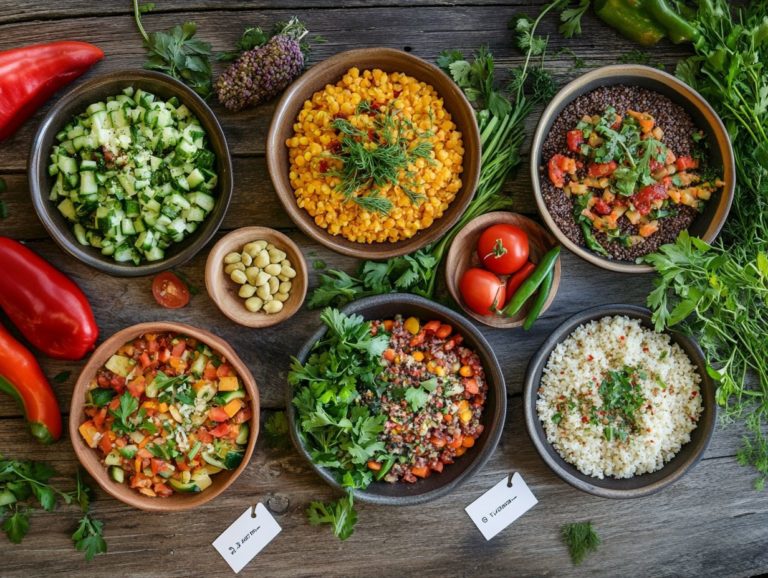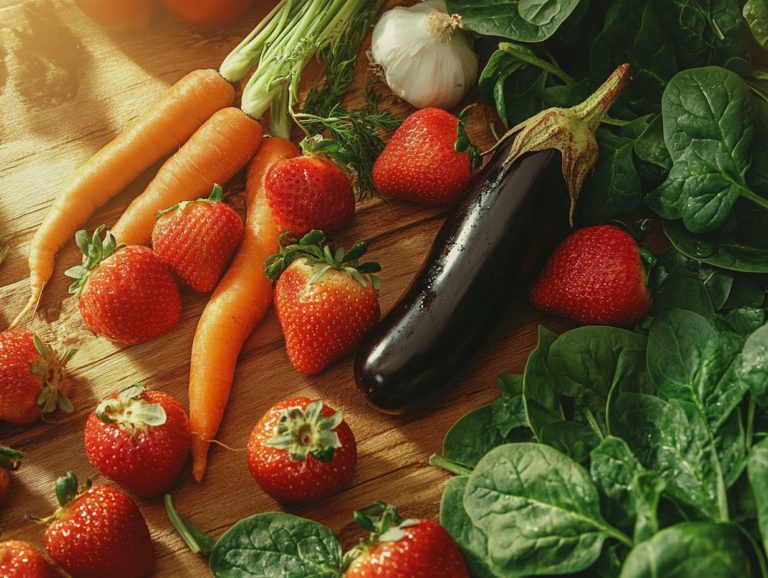7 Essential Tips for Starting a Vegan Diet
Considering a shift to a vegan diet? You re certainly in good company. With an increasing awareness of health, environmental, and ethical factors, many individuals are diving into the world of plant-based living.
Transitioning to veganism might seem daunting, but it doesn t have to be that way. This guide presents seven essential tips designed to help you navigate your journey from educating yourself and making gradual adjustments to discovering delectable recipes and connecting with supportive communities.
Embrace the advantages of a vegan lifestyle while ensuring your nutritional needs are met. It’s time to embark on this exciting journey!
Contents
- Key Takeaways:
- 1. Educate Yourself on Veganism
- 2. Start Slowly and Make Gradual Changes
- 3. Experiment with Different Recipes and Foods
- 4. Focus on Whole Foods and Nutrient-Dense Options
- 5. Make Sure to Get Enough Protein and Other Essential Nutrients
- 6. Be Prepared for Social Situations and Eating Out
- 7. Find Support and Connect with Other Vegans
- What Are the Benefits of a Vegan Diet?
- What Are the Potential Challenges of a Vegan Diet?
- How Can One Transition to a Vegan Diet in a Healthy Way?
- What Are Some Common Nutrient Deficiencies in a Vegan Diet and How Can They Be Avoided?
- How Can You Ensure You Are Getting Enough Protein on a Vegan Diet?
- What Are Some Delicious and Easy Vegan Meal Ideas?
- How Can You Deal with Criticism or Pushback When Starting a Vegan Diet?
- What Are Some Resources for Learning More About Veganism and Plant-Based Eating?
- Preguntas Frecuentes
- Cu les son los 7 consejos esenciales para comenzar una dieta vegana?
- Es necesario eliminar completamente todos los productos animales al comenzar una dieta vegana?
- C mo puedo asegurarme de que estoy obteniendo suficiente prote na en una dieta vegana?
- Hay alguna deficiencia de nutrientes potenciales a tener en cuenta en una dieta vegana?
- C mo puedo lidiar con los antojos de alimentos no veganos al comenzar una dieta vegana?
- Todav a puedo comer en restaurantes mientras sigo una dieta vegana?
Key Takeaways:
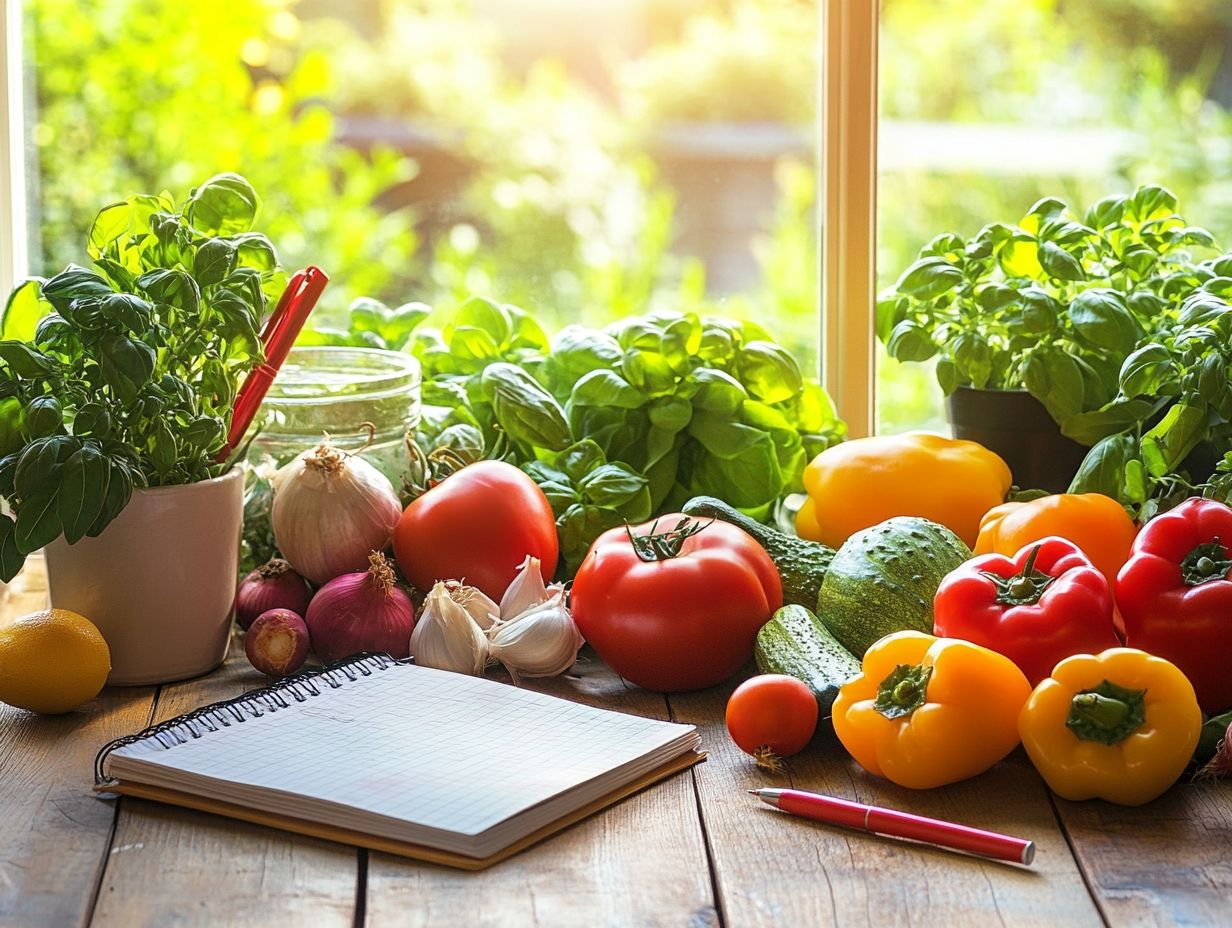
- Educate yourself on veganism.
- Start your vegan journey with gradual changes.
- Focus on whole foods to meet your nutritional needs.
1. Educate Yourself on Veganism
Educating yourself on veganism is the essential first step toward embracing a vibrant, plant-based diet that enhances your personal well-being and helps the environment and protects animals.
Explore a variety of resources like important books and documentaries. Influential titles such as The China Study and eye-opening films like Cowspiracy can give you a deeper understanding of the extensive benefits associated with reducing animal product consumption.
A well-planned vegan diet can provide you with all the important nutrients, including proteins, iron, calcium, and omega-3 fatty acids, crucial for maintaining optimal health.
Going vegan can greatly lower your carbon footprint, as animal agriculture is a major contributor to greenhouse gas emissions and habitat destruction.
Dive into the wealth of information out there! It will help you make smart choices for a greener future.
2. Start Slowly and Make Gradual Changes
Transitioning to a vegan lifestyle can be an exhilarating journey. Take your time and enjoy the process; it can be a culinary adventure!
Instead of completely overhauling your diet overnight, consider introducing vegan meals just once a week. This approach allows your taste buds to acclimate while giving you a deeper appreciation for plant-based ingredients, and you can learn more about this method in our guide on how to create a balanced vegan meal plan.
Think about swapping familiar staples like dairy with almond milk or cheese with cashew cream; these small changes can significantly enhance your culinary experience.
If you encounter challenges such as cravings or limited options, reaching out for community support whether through online groups or local meet-ups can offer encouragement and a treasure trove of shared recipes, making your transition both delightful and sustainable.
3. Experiment with Different Recipes and Foods
Trying different vegan recipes and foods is one of the most enjoyable parts of embracing a plant-based diet. It opens a world filled with diverse flavors and culinary creativity.
This journey invites you to explore a myriad of cuisines, from comforting layers of vegan lasagna that capture the essence of Italian comfort food to aromatic and savory stews characteristic of Thai cuisine.
Each dish offers a unique fusion of spices, fresh ingredients, and inventive techniques that spark excitement in your culinary efforts. Here, creativity takes center stage, allowing you to reinvent traditional recipes, swap animal products for plant-based alternatives, and create meals that truly delight your palate. Transform each dining experience into something both satisfying and revitalizing.
4. Focus on Whole Foods and Nutrient-Dense Options
Focusing on whole foods and nutrient-dense options is vital for anyone following a vegan diet. This ensures your meals are healthy, satisfying, and diverse.
By including a vibrant array of fruits, vegetables, whole grains, and legumes, you unlock numerous health benefits. These foods are packed with vitamins, minerals, and antioxidants that enhance nutrition and support your body’s functions.
The fiber in whole foods helps digestion and maintains steady energy levels. This reduces cravings and promotes a sense of fullness and well-being, making it easier to stick to a healthy lifestyle.
5. Make Sure to Get Enough Protein and Other Essential Nutrients
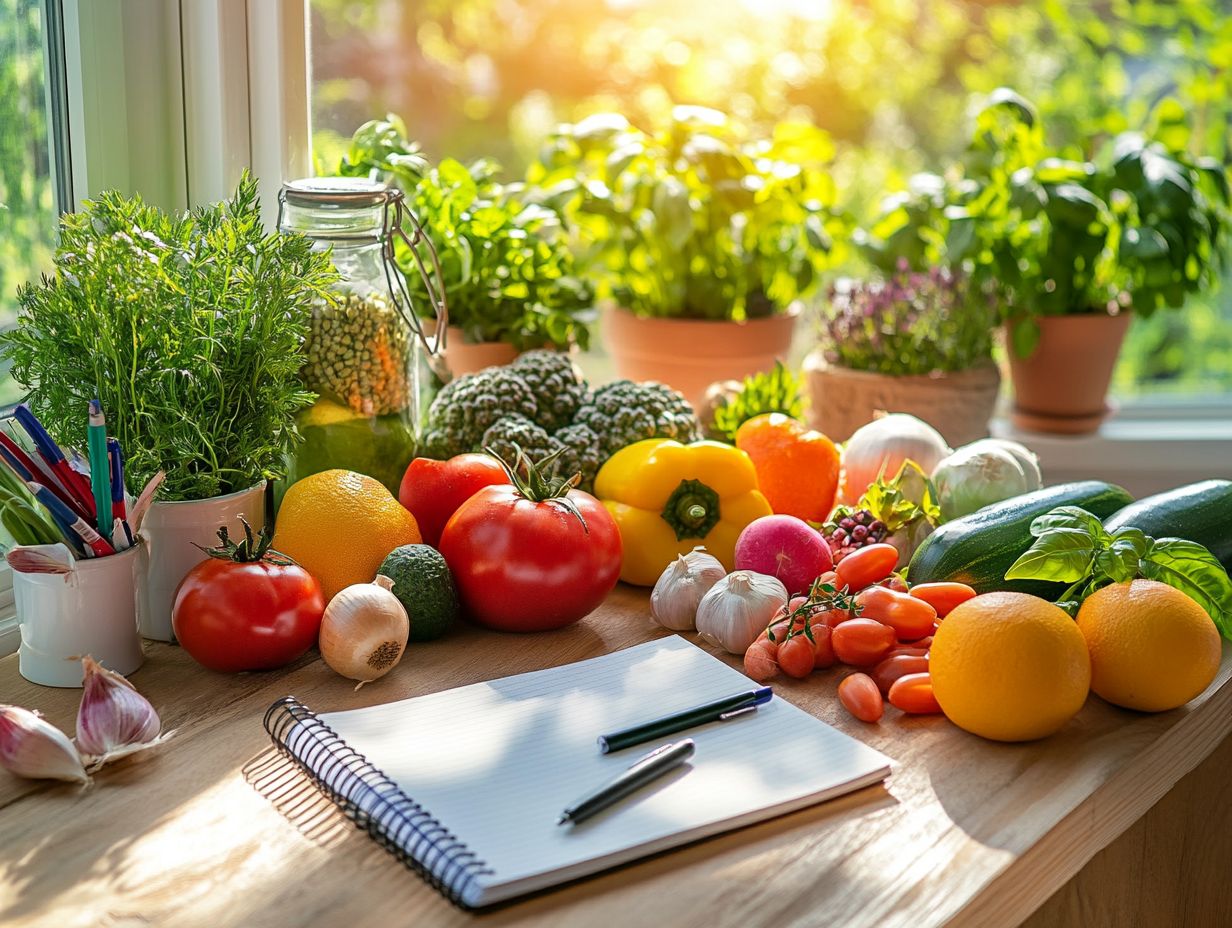
Ensuring you have adequate protein intake and other essential nutrients is vital when adopting a vegan diet. This approach helps maintain your energy levels and supports a balanced lifestyle.
Diverse plant-based protein sources include:
- Legumes like lentils, chickpeas, and black beans
- Grains like quinoa and farro
These provide the necessary building blocks for muscle and tissue repair. While these options are rich in fiber and amino acids, it’s important to address potential deficiencies in key nutrients typically found in animal products.
For example, vitamin B12 is crucial for nerve function and can be obtained through fortified foods or supplements. Omega-3 fatty acids, often sourced from fish, can be found in chia seeds, flaxseeds, and walnuts.
By incorporating a variety of these foods into your meals, you’ll enjoy a wide range of nutrients that boost your health!
6. Be Prepared for Social Situations and Eating Out
Navigating social situations and dining out while following a vegan diet can pose unique challenges. However, with the right preparation and mindset, it can transform into a delightful experience.
Researching restaurants that offer plant-based options can significantly reduce the stress of eating out. Utilizing websites and apps that highlight vegan-friendly establishments allows you to explore a variety of cuisines that align with your dietary choices.
Engaging in open conversations with friends or hosts about your dietary preferences fosters understanding and creates a collaborative dining atmosphere. Don t hesitate to suggest restaurants or dishes; this proactive approach can turn a potential hurdle into a rewarding social experience, showcasing the delicious diversity of vegan cuisine available.
7. Find Support and Connect with Other Vegans
Connecting with other vegans and immersing yourself in the community can truly elevate your transition to a plant-based lifestyle. This transforms the journey into something far more enjoyable and fulfilling.
This sense of belonging, whether through online forums, lively social media groups, or engaging local meetups, creates an invaluable support network. When challenges arise be it cravings or social pressures these connections provide the motivation and encouragement you need.
Sharing experiences fosters camaraderie, reminding you that you’re not alone on this path. By leaning on one another, you can celebrate victories, swap tips and recipes, and offer comfort during tough times.
It reinforces the idea that overcoming obstacles isn’t just feasible, but often becomes a shared adventure, rich with collective triumphs.
What Are the Benefits of a Vegan Diet?
Adopting a vegan diet offers many benefits. It promotes personal health, environmental sustainability, and animal welfare.
This lifestyle choice aids in weight management through low-calorie foods that are rich in nutrients. It also enhances your overall well-being by encouraging a delightful variety of fruits, vegetables, and whole grains in your meals.
By moving away from animal products, you can significantly reduce your carbon footprint. This contributes to a more sustainable planet for all.
Embracing this compassionate approach toward animals fosters a deeper sense of empathy. It aligns your dietary choices with your ethical values.
The focus on plant-based eating allows you to explore diverse flavors while receiving essential nutrients. Ultimately, this guides you towards healthier living and a more harmonious existence with the Earth and its inhabitants.
What Are the Potential Challenges of a Vegan Diet?
While embracing a vegan diet presents numerous benefits, you might face some fun challenges! Cravings for non-vegan foods, navigating social situations, and maintaining nutritional balance can arise.
As a new vegan, you may find yourself yearning for familiar flavors and textures. This can make the transition feel a bit overwhelming.
Dining out or attending social gatherings may pose difficulties, especially when vegan options are few and far between. Ensuring you get a well-rounded intake of essential nutrients like protein, iron, and vitamin B12 can also become a pressing concern.
To tackle these challenges, explore delicious plant-based alternatives. Embrace meal prepping to keep those cravings at bay.
Educating yourself about nutrition is vital. Consider supplements when necessary to help you maintain a healthy balance, making your journey into veganism both enjoyable and sustainable.
How Can One Transition to a Vegan Diet in a Healthy Way?

Transitioning to a vegan diet in a healthy manner involves making informed choices. To learn more about this process, consider exploring how to transition to a plant-based diet by gradually introducing plant-based foods and ensuring you maintain nutritional adequacy throughout the journey.
To facilitate this shift, engaging in thorough meal planning can be highly beneficial. This approach helps you avoid last-minute unhealthy choices and ensures that all essential nutrients are included in your diet.
Taking the time to educate yourself about nutrition is invaluable. By understanding which foods provide the necessary vitamins and minerals, you can make more intentional decisions as you adjust your dietary habits.
Seeking guidance from dietitians or seasoned vegans offers insights and tips that elevate your transition experience. Support from these knowledgeable sources enables you to navigate potential challenges while discovering meal planning tips for vegetarians and vegans that truly resonate with your personal tastes.
What Are Some Common Nutrient Deficiencies in a Vegan Diet and How Can They Be Avoided?
A vegan diet can occasionally lead to common nutrient deficiencies, such as vitamin B12 and omega-3 fatty acids. However, with a bit of careful planning and awareness, these gaps can be easily filled.
It s crucial to take an active approach in sourcing key nutrients while following a plant-based lifestyle. For instance, since vitamin B12 is important for nerve health and is mostly found in animal products, you can opt for fortified foods like plant milks, cereals, and nutritional yeast to bridge that gap.
As for omega-3 fatty acids, vital for heart and brain health, you might find them lacking in a vegan diet. They are readily available from flaxseeds, chia seeds, and hemp seeds. If your dietary sources aren t quite enough, considering a high-quality supplement derived from algae could also be a smart move.
By being mindful of these nutrients, you can ensure that your vegan diet is not only healthful but also well-rounded.
Embrace the vegan lifestyle and enjoy every delicious bite!
How Can You Ensure You Are Getting Enough Protein on a Vegan Diet?
Ensuring you meet your protein needs on a vegan diet is achievable through a diverse array of plant-based sources, including legumes, grains, and a sprinkle of creative meal planning.
With a bit of thoughtful consideration, you can seamlessly integrate these protein-rich options into your daily meals. For example, beans and lentils are versatile; they can elevate salads, enrich stews, or be transformed into hearty veggie burgers that satisfy cravings.
Quinoa and farro provide excellent bases for bowls. They offer a delightful nutty flavor while packing in the protein you need.
Incorporate nuts and seeds, like chia or hemp seeds, into your smoothies or oatmeal. Dishes such as chickpea curry or roasted vegetable and quinoa salad can spark your meal prep creativity.
What Are Some Delicious and Easy Vegan Meal Ideas?
Discovering delightful and effortless vegan meal ideas can elevate your cooking experience! Transforming plant-based dining into something truly enjoyable and satisfying is within your reach.
With many vibrant flavors and textures at your fingertips, whipping up a comforting stew or a fun vegan pizza can turn into an exciting cooking experience.
These recipes not only highlight the versatility of ingredients but also encourage creativity. Experiment with different combinations and spices!
Preparing these dishes with family and friends creates cherished moments and underscores the joy of sharing nourishing food that is both kind to the planet and a treat for your taste buds.
How Can You Deal with Criticism or Pushback When Starting a Vegan Diet?
Dealing with criticism or pushback when you embark on a vegan diet can feel daunting, but with the right mindset and support, you can navigate these situations with confidence.
It’s crucial to recognize that skepticism often arises from a lack of knowledge or familiarity with veganism. One effective approach is to share your journey and educate those around you about the choices you ve made and why they resonate with you.
Highlight compelling reasons such as:
- Ethical considerations
- Environmental impacts
- Health benefits
Seeking support from the vegan community can profoundly impact your experience. Connecting with like-minded individuals provides encouragement and validation in the face of negativity.
By drawing from your personal experiences discuss how you ve positively transformed your health or discovered new culinary delights you can make your journey relatable and inspire others to respect your choices.
What Are Some Resources for Learning More About Veganism and Plant-Based Eating?

A treasure trove of resources awaits you if you’re eager to delve deeper into veganism and plant-based eating. Explore books, websites, and community groups that provide insights into vegan nutrition, meal planning, and ethical considerations.
Books like How Not to Die by Dr. Michael Greger and The Vegan Starter Kit by Neal Barnard come highly recommended for their practical advice and scientific foundation.
Websites such as Vegan Outreach and the Physicians Committee for Responsible Medicine serve as excellent platforms for articles and videos that tackle common concerns surrounding a plant-based diet.
Additionally, local vegan workshops can be invaluable. They provide hands-on experience and a sense of community that will enrich your journey into the world of veganism.
Preguntas Frecuentes
Cu les son los 7 consejos esenciales para comenzar una dieta vegana?
Los 7 consejos esenciales para comenzar una dieta vegana son:
- Investigar y educarte sobre el veganismo
- Hacer una transici n gradual a una dieta basada en plantas
- Abastecerte de alimentos b sicos veganos
- Incluir una variedad de frutas y verduras
- Experimentar con nuevas recetas e ideas de comidas
- Incorporar fuentes de prote nas vegetales
- Mantenerte consciente de tus necesidades nutricionales y suplementar seg n sea necesario
Es necesario eliminar completamente todos los productos animales al comenzar una dieta vegana?
S , una dieta vegana excluye todos los productos animales. Esto incluye carne, l cteos, huevos y miel.
Este enfoque tico busca no causar da o a los animales.
C mo puedo asegurarme de que estoy obteniendo suficiente prote na en una dieta vegana?
Hay muchas fuentes de prote nas vegetales. Incorpora frijoles, lentejas, tofu, tempeh y quinoa en tus comidas.
Hay alguna deficiencia de nutrientes potenciales a tener en cuenta en una dieta vegana?
Una dieta vegana puede carecer de hierro, calcio y vitamina B12. Presta atenci n a estos nutrientes y considera suplementos si es necesario.
C mo puedo lidiar con los antojos de alimentos no veganos al comenzar una dieta vegana?
Los antojos son comunes durante la transici n a una dieta vegana. Busca alternativas veganas que satisfagan tus antojos, como versiones vegetales de tus platos favoritos.
Todav a puedo comer en restaurantes mientras sigo una dieta vegana?
Claro, muchos restaurantes ofrecen opciones veganas. Revisa el men antes y comunica tus necesidades al personal.
Tu viaje hacia el veganismo puede ser delicioso y satisfactorio!

